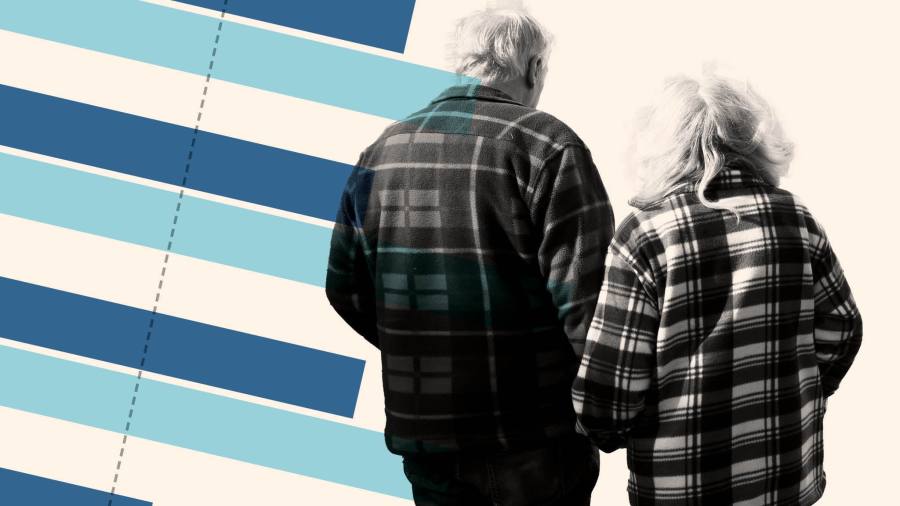One-fifth of Britons say they are being forced to borrow more money to meet their payments, with half unable to save at all, in a sign that households are feeling the pain of the cost of living crisis.
UK inflation is rising at a near 40-year record pace while lenders are raising their mortgage rates after the announcement of the government’s “mini” Budget pushed up expectations of further monetary tightening by the Bank of England.
The stress this is putting on households is now clearly visible with fresh data showing that the proportion that are in financial difficulty is increasing, with spending falling and consumer confidence at a record low.
While the “mini” Budget, announced by the chancellor last month, was intended to boost economic growth through tax cuts, some analysts argue that it is having the opposite effect.
Paul Dales, chief UK economist at Capital Economics, warned that the fiscal plan risked “lengthening the cost of living crisis and overlaying [it with] a cost of borrowing crisis”.
The government’s approach to the economy will probably result in more persistent inflation and higher interest rates, leading to a deeper recession and ultimately higher unemployment in the medium term, said Dales.
But new data show that consumers are already struggling. In the two weeks to September 25, 22 per cent of the population said they had to borrow more money or take out credit — an increase of six percentage points from November last year when the survey was first conducted — according to a report by the Office for National Statistics.
The findings tie in with recent data from the Bank of England that show credit card borrowing rose at its fastest pace in 17 years in August.
Peter Tutton, head of policy, research and public affairs at StepChange, a debt charity, said the “debt situation worsened in August”.
The government has released an energy support package, which limits yearly household energy bills to £2,500 on average, but this only came into effect this month with many already “significantly more stretched than they were a year ago”, said Tutton.
He added that people were “vulnerable to panic borrowing to try to fill the gap between their income and their essential spending”.
Nearly half the population think they will be unable to save any money in the next 12 months, up from one-third last year, the ONS data showed.
A further one-third said they would be unable to afford an unexpected but necessary expense of £850 — a measure of the risk of poverty — representing an increase of 5 percentage points since November.
Martin Beck, chief economic adviser to the consultancy EY Item Club, said consumers were being affecting by many pressures.
“You’ve got high inflation, falling real wages, you’ve got people with mortgages paying more interest,” all of which will be detrimental to consumer spending, he said.
As many as half of respondents said they found it difficult to afford their energy bills in September, according to the ONS. Almost one-third had struggled to meet mortgage payments. Mortgage rates are expected to triple to about 6 per cent next year following further monetary tightening by the central bank.
Gabriella Dickens, economist at the consultancy Pantheon Macroeconomics, said that a boost to consumer spending from the energy support scheme was likely to be “offset by the market disruption” following the “mini” Budget.
Dickens expects most households to use more of their savings for debt repayments rather than spending, forecasting a 1.5 per cent contraction in household expenditure next year.

In a sign that household budgets are already tightening sharply, retail sales fell steeply in August. Meanwhile, the number of new car registrations was lower in September than in the same period last year.
Data showed that two-thirds of Britons said they had to reduce non-essential spending and gas electricity or gas usage, while more than two in five reported cutting back on groceries and car usage, ONS data showed.

The consumer association Which? found the number of households making adjustments to cover essential spending was at a 10-year peak.
Its research showed that two-thirds of those surveyed — or 18.2mn households — had cut back on essentials, sold items or dipped into savings.

According to Google data, which tracks visits to retail and entertainment venues, numbers were down 11 per cent last month compared with February 2020. Meanwhile, spending on entertainment had fallen to 30 per cent below pre-pandemic levels, even without adjusting for inflation, according to fintech company Revolut.
Yael Selfin, chief UK economist at KPMG, said: “Consumer spending is weakening and margins are [being] squeezed, as businesses are finding it harder to pass on higher costs.”



